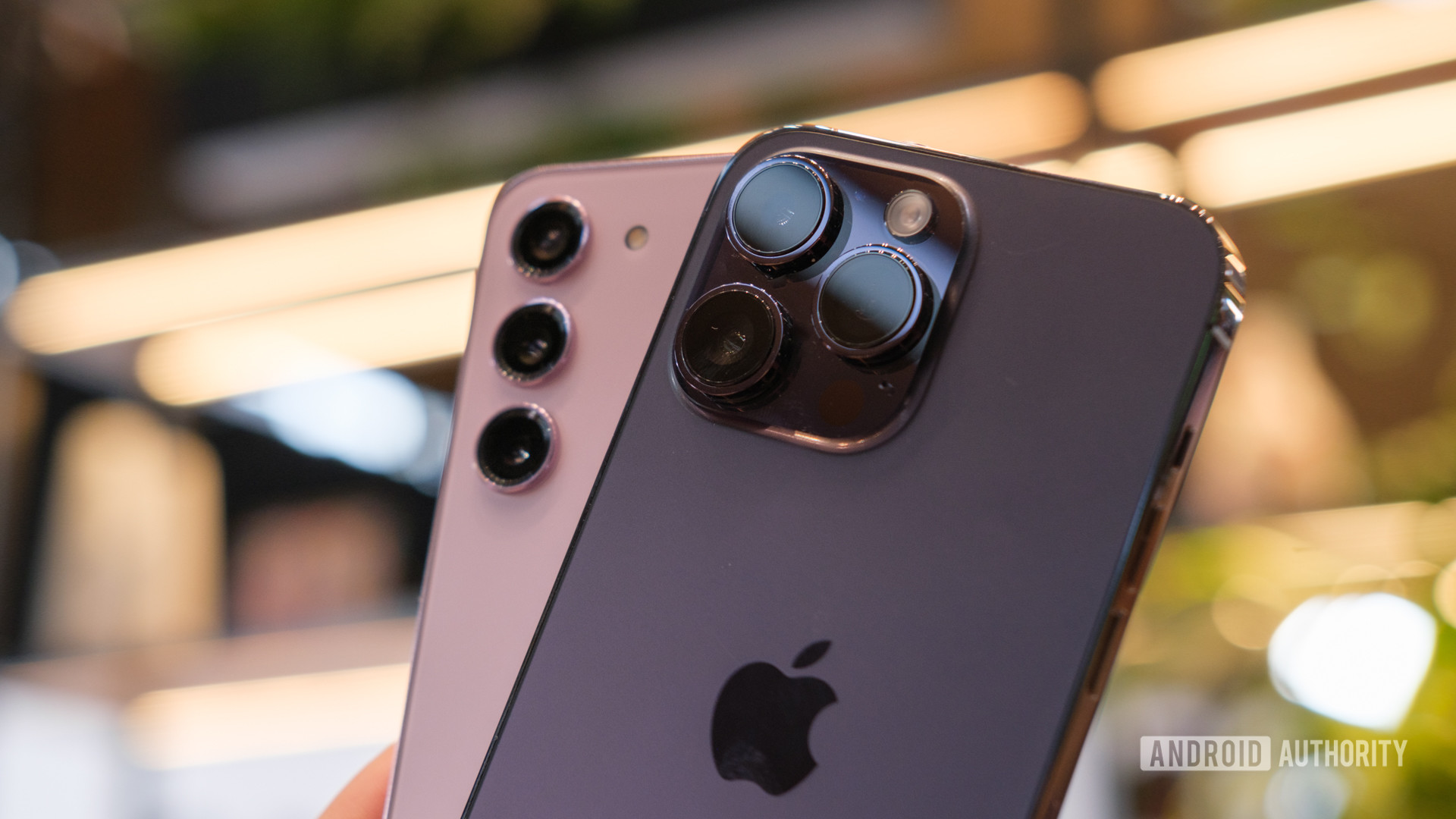TL;DR: Apple dominates the US smartphone market, but EU regulations may offer Android a chance for resurgence by enforcing messaging interoperability and standardizing hardware features.
This is so funny for someone from Europe. Nobody I know cares what phone you have.
And everyone is using chat apps, mostly WhatsApp or signal, so everybody has the same great chatting experience.
Said like someone who can’t afford an iPhone…
Just kidding, I use Samsung myself. It’s crazy how easy it is to brainwash Americans into worshiping their corporate gods. Couple of good ads and they will die for their brand or choice.
My wife was bullied into getting an iPhone because of her colleagues, and they were buy one get one free, so now I have one too.
It’s a phone, I’m happy
buy one get one free
Still got scammed, arguably lmao
People get so hostile over such things. I have an iPhone for business. I have a Pixel for my personal use. They’re alright. It depends on what you need. Still a smartphone enthusiast.
Ugh, sounds like some of my coworkers and MacBooks. Then you discover that MacBooks are seriously crippled compared to the Linux machine you were using and you get told one of:
- “What do you mean by $feature? I’ve never heard of that.”
- “Why would you want to do that?”
- Run a badly performing Linux VM in a janky hypervisor to do that
- Pay $10 for this little 3rd party app to fix the problem
Throw in some serious RSI pain from that tire fire of a keyboard and yeah, I have no idea why I switched.
Edit: Work machine. No way I’d pay for Apple with my own money.
I’m stuck working on a MacBook too and it’s horrendous. I plug it into a monitor and use a good keyboard, but it’ll never be useful as a portable computer with that garbage keyboard
Using more than one monitor was the first “Why would you want to do that?” moment. Window management on Macs is awful but adding screens makes it way worse. Coming from i3 and sway, with rich hotkeys and fast, straightforward window manipulation, it felt like someone forgot to finish writing the OS. It seems most people use only the laptop screen or have a single external monitor as an auxiliary? They just genuinely didn’t know why or how you use multiple monitors.
Tiling in macOS can be polyfilled with apps but there are tons of edge cases where it fails and the app’s hotkeys don’t flow well from the a handful of native keys, so it feels disjoint and bodged together. Also, if you “bump” a window, it’ll stay dislodged because it’s a poor mimicry of the real thing.
What are these edge cases you are talking about? I been using Rectangle for many years and have no issues with multi-monitor setup. My company with over 2000+ devs use this app without any issues.
Amethyst. Focusing on empty workspaces makes everything stop working. Certain window types (dialog popups, arguably that app shouldn’t be using popups) are “invisible” to it. System preferences is untouchable (fair) and shows up under all other active windows.
Americans are all about status symbols and knowing names. Runs in our eagle screeching capitalist blood.
It’s rough in the US. Most iPhone users will insist that iMessage is better and refuse to use anything else, and then whine when an android user is in a group chat and none of the features work.
I have several group chats with both android & iPhone users. No one complains. The only place I hear about people complaining is the Internet, never anyone in the wild.
Yes. Everybody and their grandma in Spain (at least) is using WhatsApp.
Thank you. Based EU citizens genuinely carrying the US on this issue, and we are looking forward to removable batteries.
Some modern phones still have removable batteries, like my Motorola e5 play, its quite useful if the phone locks up bad, I can pop the battery out to restart it.
Yeah same here
UK. I’ll get the odd joke from an iPhone user but we all use WhatsApp and no one really cares.
Try to use something that’s something other than iOS or Android with Google services.
(I’m daily driving deGoogled Android, I can live, but just can get sick of all the pressure around world is taking on not having Google Play Store)
deleted by creator
The statement about a massive majority of iPhones in the Nordics is factually incorrect.
iPhone has a slight lead at one of the biggest vendors Komplett, but that is without counting the remaining 10 % which is almost exclusively Android units.
For clarity: Komplett operates in all the Nordic countries, but I would assume these numbers are for Norway, the richest of the bunch.It’s the same story at work where I am the responsible party for company phones: Pretty evenly distributed where some of the iPhones are chosen due to MLM solutions for those wishing certain solutions.
I can only speak for my own age group in my personal life, but I would say Android has a quite big lead with young adults.
Kids/teens might be a completely different story though.
This is such a weird headline. I’m not switching to Apple and know tons of people who also would never do that. Most people don’t care about blue vs. green chat bubbles, except for those who just use their iPhone as a status symbol.
Sure, messaging needs to get fixed, and I hope the EU pushes Apple towards open standards. But it’s not like there aren’t a ton of android manufacturers who are making money hand over fist on devices.
How old are you? A lot of this is a youth phenomenon. Shit I was out of college before the internet existed. I can’t possibly relate to 13 and 14yo kids getting their first phones now. Maybe they do care about the green bubble.
Yeah even among younger millennials, the green bubble is a big deal. It’s not the color of the bubble, it’s the ability to use more advanced chat functions like reactions, and if any phone in an iMessage group is Android, it breaks the functionality for the entire group.
I’ve always had an android phone and I’ve had to deal with shade from Apple sheeple regarding group messages on many occasions.
Look at the iMessage saga; Apple insists on treating Android owners like second-class citizens in group texts. Android owners can’t enjoy many modern messaging features with iPhone owners, such as high-quality media sharing, read receipts, and more.
Are WhatsApp, Telegram, Discord, Signal, and such blocked in the US? What’s with that whining about iMessage?
Are WhatsApp, Telegram, Discord, Signal, and such blocked in the US?
Of course they’re not blocked.
People just default to the app that comes pre-installed with their phone and sits right there on the first screen, because it’s marginally easier than picking a third party app in the App Store, installing it, and creating an account.
It’s the exact same argument that Microsoft made when they bundled Internet Explorer with their OS.
People just default to the app that comes pre-installed with their phone
Cannot confirm this is the case with messaging apps in the EU. Nobody uses iMessage and nobody uses whatever the current Google thing is each year. WhatsApp is dominat despite not being preinstalled on any major phone brand (certainly not Samsung and Apple).
Apples to oranges.
The reason is that messaging services like WhatsApp became popular in Europe because carriers charged exorbitant fees for SMS messaging at a time when no single phone manufacturer absolutely dominated the market. Apps like WhatsApp made it possible to communicate with people, no matter which specific phone or brand or platform they were using.
If the iPhone (with iMessage pre-installed) had been the dominant smartphone and ecosystem at the time, chances are that what’s happening in the US would have happened in Europe in exactly the same way.
It’s exactly the same argument as with Windows and Internet Explorer: if Windows had been one podunk operating system out of many, nobody would have cared. The whole issue was that Microsoft used the market dominance of Windows to quasi-lock users into Internet Explorer.
It’s exactly the same argument as with Windows and Internet Explorer
No, it’s not. Maybe I’ve looked at the wrong numbers but according to https://www.counterpointresearch.com/us-market-smartphone-share/ iPhones have a market share of 50–60% in the US, not 90% like Windows on PCs. It shouldn’t result in total iMessage dominance. If anything the somewhat equal market share should mean that Telegram/Signal/WhatApp/whatever should be especially popular.
“Market dominance” simply means that a single company has the means to shape the entire market - not that it must have 90+ percent market share.
You’re essentially arguing that it’s easier for a user to find a third party app in the App Store, install it, create an account in the app, and start messaging than it is to start messaging with the pre-installed first party app.
I don’t find that persuasive.
You’re essentially arguing that it’s easier for a user to find a third party app in the App Store, install it, create an account in the app, and start messaging than it is to start messaging with the pre-installed first party app.
I don’t find that persuasive.
It works in the rest of the world. Not hyperbole. In literally the rest of the world manages to do that. Only in the US does half of the user base let itself get bullied by the other half, instead of just using a service that works equally well on both. And while it’s technically “create an account in the app”, no normie user feels that an account is being created. Works with phone number, just enter a verification code, done.
It’s like how the US got so far ahead with reliable universal twisted-pair phone lines, it took a lot longer here for people to really start having just a mobile phone compared to countries that were able to side-step their inadequate landline infrastructure with mobile phone services. WhatsApp largely gained prominence in countries that had much more cost effective data plans than SMS texting, making WhatsApp cheaper than SMS along with being available at all on Android (vs iMessage). In the US we had unlimited SMS messages included in plans before anything approaching that for data. So in the US SMS was already quite well entrenched in social circles by the time iMessage came out. And Apple knew that people wouldn’t be so loyal to iMessage if they couldn’t message with whatever non-trivial percentage of the social circle didn’t have an iPhone so it inlucded SMS-fallback. There’s plenty of WhatsApp and Signal users in the US at this point. But nobody cares enough to try and get everyone to switch to one platform that is available everywhere and doesn’t have SMS fallback, so SMS is still the glue that holds all the messaging together in the US.
edit: I think I can safely say it’s going to take the big 3 carriers in the US all agreeing to drop SMS (which pretty much will probably take the GSM standards body dropping SMS) for the US to truly move off of it.
That’s only valid if you’re comparing the US with 3rd World nations.
When mobile phones took of, even poor peripheral southern european nations (like mine) already had good fixed line telephone infrastructures and certainly the few people who didn’t have a phone line yet weren’t the kind that could afford early mobile phones.
In reality the fast growth in mobile phone adoption in the EU vs US is a case study in how top down enforced standardization can help markets: whilst the US had multiple network standards which required diferent phones and were incompatible with each other, in Europe governments were forcing mobile carriers (by making it a condition to get a radio spectrum license to operate as one) to use GSM, so all phones were compatible and pretty much from day 1 you could, for example, use your phone in a different country even though it was linked to a diferent carrier in your home-country.
Because of this, even though the mobile phone infrastructure started behind that of the US, it and mobile phone adoption grew much faster than in the fragmented US market and this was what allowed Nokia from Finland to, for a while, be the largest mobile phone manufacturer in the World (most of which they lost when smartphones became a thing).
Eventually the US itself ended up doing the same thing, if I remember it correctly by around the late 90s with v3 of GSM.
Those are valid observations, but the different technologies all terminated to the POTS network, so phone calls across networks always worked. But it was just considerably more expensive to make phone calls on mobile than land lines where you could get flat-rate unlimited calling (local, not long distance, getting a cell phone then could potentially be cheaper for long distance). It was the early 00s when flat-rate unlimited plans were becoming common in the US, and that’s when people started ditching their land lines.
AT&T was notable for being the first one (of the Big 3) here using internationally compatible GSM in the 90s. But it actually wasn’t until LTE that Verizon stopped using CDMA for data (but they still used it for voice) in 2010 when we finally started seeing things trend towards adopting a common standard in the Big 3 national carriers. Sprint went with Wi-MAX instead of LTE for data at that time, and having to retool to LTE was one of the financial straws that broke their back.
It was exactly the same in Europe in terms of fixed line vs mobile call prices and ultimate connectivity.
The difference is that any mobile phone (the actual device) that worked for any one carrier in Europe would work for any other carrier in Europe, and although that carriers did try to lock-in customers with contracts and even carrier subsidized network locked phones, it was still possible to change carriers (especially after supporting number portability was made mandatory) plus roaming just seamlessly worked when moving all around Europe (turning the potential problem of market fragmentation in Europe into a strength as rather than a handful of continent-wide carriers with spotty coverage in some places, in Europe local carriers focused on local coverage and access when outside your carrier’s are was provided via some other carrier via roaming).
I remember the talk on the Internet at the time (I’ve had a mobile phone since the 90s) and how americans constantly complained of the need of different phones for different carriers and the uneveness of countrywide coverage, unlike in Europe were if you bought your own “mobile phone” it would just work with whatever carrier you chose.
(Mind you, carriers tried to lock-in customers with locked phones, which funilly enough resulted in the mushrooming of little stores which would unlock your phone, all perfectly legal).
And yeah, LTE was part of GSM v3, hence why I mentioned it as the point when the US finally standardized its mobile network.
I don’t disagree with you about different network technologies being a hindrance, but I was focused on things that make an analog to why SMS is so much more entrenched in the US. Clearly not a perfect analogy was made. :)
I tried to use the Google chat apps. There were some nice ones. ( still missing allo). But they changed too often, so now no Google chat app anymore.
It’s not that I’m unable to install an app on my phone and learn how to use it, it’s that I’m unable to convince every person I know to install that app, then teach them all how to use it.
100% of iPhone users have iMessage. And they can use the same app to talk to 100% of their contacts.
Fragmentation is a huge problem for everything else. What percentage of Android users have any particular one of those apps you listed?
I only grudgingly install WhatsApp when I travel to Europe. Discordv and Slack are not really competitors in this space (though I’m sure there’s a small subset of users who use them that way). I have Signal and Telegram and yet I still use SMS with most of my contacts because that’s the only one that is guaranteed to work.
I’ve tried getting my friends onto Signal, with some amount of success. But many have eventually stopped using it because I was the only one they used it with. A couple of my iPhone-using family members reported that they stopped getting notifications from Signal because they used it so infrequently that iOS basically disabled it (I guess it does that after a month of disuse but I’m not sure exactly).
It’s a losing battle. We’ve fallen back to SMS.
Fragmentation is a huge problem for everything else. What percentage of Android users have any particular one of those apps you listed?
WhatApp is installed on little bit under 100% among all Android phones and iPhones in most EU countries and should the EU actually tackle messenger interoperability, iMessage is definitively not the main target. The most die-hard Apple fans I know use iMessage for a little bit when new features were introduced. Then they go back to WhatsApp like everybody else.
To be clear: I’m not an advocate of WhatApp here, I’m merely explaining that the EU does not care at all about Apple’s chat service nobody in the EU uses. Should any legislation even affect iMessage, it’ll be more coincidental, not targeted at it.
I don’t know about the rest of the world but in the UK text messages used to cost 10p for each one you send. Multimedia messages were like 40p. Really expensive. WhatsApp came about and made both of these free. The rest is history.
Ironically, SMS are generally free these days but nobody obviously uses them. My SMS app is just full of OTP codes being sent to me.
This seems to have happened in most of the world. The US still sticks to SMS because it is free since before chat apps became a thing. SMS was a terrible experience because you would pay per message thanks to carriers’ greed. It didn’t keep up with the demand for constant communication.
Nowadays in Brazil SMS is also free, but by the point they did that, WhatsApp had already become ubiquitous, and had much better features such as sending location, consistent experience with features over different devices, group chats with moderation, voice messages, free voice calls to any user over the world, etc., besides being built from scratch as an SMS substitute (would simply use your mobile number). No one would willingly go back to SMS.
Seems like only some Asian countries defaulted to a different app such as Kakao Talk.
There was Kik Messenger back then but it was more like an anonymous chat app.
You’re from Brazil? I just want to say, if English is not your native language you’d have a hard time convincing me it isn’t.
SMS is the same in the UK these days. Free. MMS isn’t though. They still like to scam the older users who know no better.
A couple of my iPhone-using family members reported that they stopped getting notifications from Signal because they used it so infrequently that iOS basically disabled it
THE BEST OS ever /s
Android does the same thing. I stopped getting telegram notifications because I hadn’t opened it up in a month. It’s a privacy feature. If you haven’t used an app in a while, it removes all the permissions it had.
It’s sad and I don’t have it but here in Europe Whatsapp doesn’t seem far from 100%!
It’s so dumb. I have the same problem. I have an iPhone and I try to get them to use Signal, but they just keep using SMS and we keep getting garbage video being sent over group text since some of the group uses Android. When I complain they start putting stuff in Google Photo Albums instead of just using a decent messenger.
such as high-quality media sharing, read receipts, and more.
Who tf wants read receipts? The first thing I do on a new phone is make sure that shit is turned off.
If you think Apple will implement these changes outside the E.U. you gotta be insane.
Also with the news that Qualcomm is hiking prices again, Samsung releasing their least ambitious Smartphone lineup ever this year, Oneplus annihalting their core audience, Huawei being banned, Xiaomi releasing the most confusing product stack imaginable, and Google taking another year off on adding meaningfull features to Android, is this really surprising?
Yeah, what a shame Android is not adding meaningful features like… checks notes… https://www.wired.com/story/apple-iphone-ios-17-ipados-17-new-features/ stickers, contact posters, some updated apps and… showing time. My god, the things I miss on Android!
@ExLisper @aluminium Android and iOS have been intercalating featureful and polishing updates with each other for a while now.
No, there are definitly things that iOS has that are lacking on Android. Same is true the other way around of course. For example, Spotlight Search on iOS is awesome, Automations are a neat tool to have, Focus Modes - not something for me - but cool for those who want it, Lockscreen customization is really good now on iOS, Backups work way better, Idle battery drain - much better on iOS…
Idle battery drain, the bane of Android’s existence. Remember when Google started to literally sleep components based on gyroscope movement data to try to save battery? And forevermore Android users were forced to deal with a phone that won’t get notifications until after you pick it up?
The problem with Android has always been the hardware integration. The sleep problem is just one symptom of a larger integration problem that spans across media standards, availability of hardware features, subpar drivers etc.
Android still suffers from many apps being designed to work on background (which works on pure Android on the emulator), but being killed depending on the manufacturer running the OS, which require tech savvy users to fix them by tweaking obscure configurations.
Android is what happens when you have a technical engineer idealizing features instead of a product person thinking about the end user first. All the problems from Android seems to be a lack of effort to standardize things or to think how that feature will impact users experience of that product.
The fact most manufactures just care about selling the device and not support it after creates a perverse incentive to fool users with bad features as long as they look good on ads.
Yes because I didn’t know about any of this
If you think Apple will implement these changes outside the E.U. you gotta be insane.
I’m interested in the logistics of this. I’m an EU citizen, I prefer using Signal for my messaging, but I do my share of Whatsapp with some people. What the EU mandates is that Apple provides an open API for everyone else to implement sending messages with to iMessage. So as an EU citizen, I will need to be able to use the API to send messages to other EU citizens. Will I be also able to send messages to people outside of the EU or will the API just say that’s not permitted? Does that infringe on my rights as an EU citizen? If it does, and I need to be permitted, will a group chat for example stop working as I leave if I’m the only European?
I mean, maybe google should stop shooting themselves in the foot when it comes to messaging. See: https://arstechnica.com/gadgets/2021/08/a-decade-and-a-half-of-instability-the-history-of-google-messaging-apps/
I don’t think it’s that important who makes the messenger. Most people outside the US use messengers like WhatsApp anyway.
It’s more about rcs compatibility, which to be fair google was really late to the party bringing it around.
Apple dominates? They have just over 50% of a carrier driven market. That’s not domination.
one single company have over 50% market share? thats domination in my book
I mean, that’s not a huge amount more than androids market share. And that’s just the US, worldwide android has something like 70% market share. As long as it’s dominating worldwide, it’s not gonna die out in the US.
I dunno, the numbers look different if you account for the many different companies that make up that android glob, while any and all ios devices are from a single company
Well, the article is about Android, the operating system. It isn’t about those hardware companies.
iPhone also has over 50% market share in Japan, Canada, Denmark, Norway, Australia and more. Currently it doesn’t have 50% market share worldwide. But in more countries it is gaining market share.
A quick search says Amazon is 37% of online commerce (depending on which sketchy result you want to trust enough for a Lemmy thread).
If Amazon is problematic, then Apple is a serious issue.
Like 90% of the under-20 market…
Only the EU can save Android in the US now
That sounds a little melodramatic. Apple has a slightly higher marketshare in the US, and that’s the case in few places:
Google has fallen second place to Apple in the Android vs. iPhone war for the first time in over a decade.
From a global perspective, Apple’s dominance is an outlier. The US, Canada and Japan are the only countries where Apple has an edge over Android. Everywhere else Android leads, usually by a wide margin.
And, I gotta say:
But this has also brought a rising tide of elitism, as some US iPhone owners perceive Android as cheaper and inferior.
I think that maybe, the point where one’s favored platform has slightly under 50% marketshare in an – admittedly large – country is maybe just a bit premature to start wallowing in victimhood.
https://www.gocomics.com/calvinandhobbes/1993/01/21/
It doesn’t help Android OEMs that Apple makes it exceptionally difficult to leave its ecosystem or switch between platforms. For starters, the company’s services are either exclusive to its platforms (iMessage) or woefully underbaked on Android (see Apple TV Plus and Facetime)
iOS is more of a walled garden, that’s true, but Google is not entirely innocent here either.
I’ve seen this a lot lately on lemmy - that android needs “saving” or that we need government intervention to stop Apple. But, I would argue that android is its own worst enemy. Even the best android phones are plagued by quality issues, both hardware and software. Google’s own pixel lineup has seasonal class action lawsuits over build issues, and now they automatically opt you into non-arbitration agreements whenever you activate a new Google phone.
Personally, I’m willing to take the risk because, in my experience, stock android is just so much better than iOS (and other android flavors). But therein lies the issue - android could compete with iPhone just fine, but android manufacturers can’t (or won’t) compete with apple’s relentless pursuit of build quality and software polish. Another damning aspect of this is that Google is supposed to be the best software company in the world, yet they’ve taken more than a decade to figure out messaging - something apple figured out back in ~2010. Android doesn’t deserve to claw back market share in the US until their phones are actually better per $ than the iPhone.
¯\_(ツ)_/¯
As somebody who has professionally done software for Android (and iOS and a lot of other things all the way back to very early dynamic websites with CGI-script backends) I would say that the biggest enemy of Android is the increasing bloat of each new version of the framework as it was not designed well to begin with, has “evolved” by layering stuff on top of stuff and has had multiple changes in the way it’s supposed to be used (in the professional lingo, “at the technical architeture level”) so it’s been a bloated mess for a while.
The result is a slower OS which uses more memory and storage and ditto for apps made for it, and they’ve even managed to fragment the developer community (by adding a 2nd programming language, for no reason other than to copy Apple in doing so) and frankly I see no sign at all that the bloatware-framework trend will stop, much less reverse (my - granted, limited - experience with Google Technical Architects is that they’re not really qualified at that level)
No you have it wrong, we just haven’t implement clean architecture with usecases, it’ll be different this time I swear, just wait until Google IO…
Look, android lost the lead in market share, but it’s still a huge part of the market. It’s not dying off for years to come, if it even does.
It will if google shitposts a bit harder
At work it was like… Most software developers had android devices, and then business and management had iPhones.
It’s literally a poor financial decision to get an iPhone in the US. Flagship pricing on Android phones in the US is so fucking low you can get an S23 for like $300 on a $20 4 month contract.
_Oh no! Android only made trillions of dollars last year! How oh how will it ever survive!?!!?!_
Am I really supposed to take an opinion like that seriously?

















